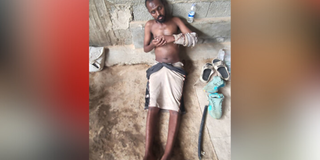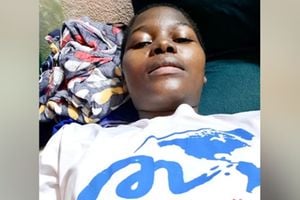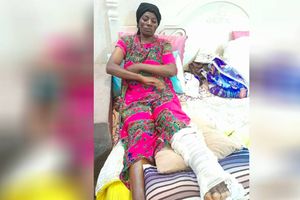
In this undated photo shared by the family, Mohamed is being held by his captors in an undisclosed location in Libya.
Sometime in March, residents of Modogashe in Garissa County received a distress call that two of their sons had been kidnapped in Libya.
Several videos of Shukri Siad Abdullahi and Idris Dubow Sheikhnoor being tortured were sent and circulated locally, forcing the community leadership to call for an emergency meeting.
“We gathered and as a community agreed to have every family donate a goat to this course,” Abdirahman Hussein, a clan elder, told the Nation on Friday.
According to Hussein, the captors were demanding Sh5 million before freeing the two young men.

Mohamed before going to Libya. He vied for Neboi Ward Rep seat in Mandera County in 2017 polls.
The local community, with the help of politicians and other well-wishers, including locally based non-governmental organisations (NGOs), raised the money and it sent through the Hawala system.
Hawala is an informal method of transferring money outside of the conventional banking system. It provides anonymity in its transactions as official records don't exist, while the source of money cannot be traced.
Hussein said the money raised was given to a local agent who sent the same to Magafe, a criminal network named after a Libya warlord who has made a business out of kidnapping immigrants heading to Europe through the Sahara Desert, from Garissa town.
Magafe means "one who never misses" in Somali language. Shukri and Idris were released but never returned home.
“We are hoping they are alive,” he said.
Notorious Magafe
Just before the dust settled, two other youth were kidnapped in Libya on their way to the Middle East in April.
The captors, believed to be the notorious Magafe, are still holding Ali Abdi Yussuf and Hassan Moge Ahmed.
“We don’t know where to get the Sh5 million the captors are demanding. We are reaching out to politicians and other well-wishers to come to our aid,” Hussein said.
During Madaraka Day celebrations at Modogashe on June 1, Hussein called on the local politicians to join hands and secure the release of the captives.
“We are having a problem of our youths being lured into a trap that leaves them held in Libya. We had two in March and we are having another two this month. The captors are demanding Sh5 million. Please help us set our youths free by raising the amount,” he said.
“We want the security agencies to investigate and arrest all the people involved in having our youths tricked into going to Europe (and the Gulf) only to be kidnapped in Libya."
The counties of Garissa, Wajir, and Mandera have all reported cases of youth being held in Libya by the Magafe.

Mohamed when he worked for Key FM, a local radio station in Mandera, between 2015 and 2017.
“Youth trafficking from this region to Libya is a serious issue involving complex transnational networks and significant human rights abuses,” Simba Hasheem, a human rights activist, said.
"This illicit trade primarily targets young people seeking better economic opportunities but who instead fall into the hands of traffickers and criminal groups such as the Magafe."
Since December, a family in Mandera has been raising funds to have their kin held by Magafe released.
Ismail Mohamed, aka Oscar Maley, arrived in Libya on December 15, 2023, and his captors called a day later demanding Sh1.5 million.
Sh800,000
“We only managed to raise Sh800,000 which was sent. He is still being held. He appears so emaciated in the recently shared videos. I am fearing for his life since we have been unable to raise the balance,” Mariam Abdullahi Hussein, a sister, said.
Youth from Mandera traverse Ethiopia and Sudan before reaching Libya, as those from Wajir choose either the Ethiopia route or, like their Garissa counterparts, use Nairobi, Busia to Uganda, then the Sudan route before getting to Libya.
“These journeys are often perilous, involving long treks through harsh terrains and encounters with various armed groups. Traffickers exploit the desperation and vulnerability of these youth, promising them work or safe passage to Europe but subjecting them to exploitation and abuse instead,” Hasheem said.
Social media
Sheikh Siat Kedie, a cleric in Garissa town, said it remained difficult to establish those involved in the trade.
“I have learned of such cases in the social media and community gathering but it is very difficult to know those involved because even the victims are not revealing how they find themselves in the wrong hands,” he said.
Mohamed Mwabudzo, Garissa County Commissioner, said despite public outcry on the issue, no single case had been reported to the authorities.
“We are just hearing about the issue in the public gathering but nobody has ever reported the issue with our security offices. We shall be forced to launch investigations into the same despite nobody having complained,” he said.

In this undated photo, Mohamed before he travelled to Libya.
The Somali community at large is perceived to be secretive, and the victims and their relatives fear reporting the matter to police for fear of victimisation.
The Magafe network is central to the trafficking and exploitation system in Libya. This group operates with impunity due to the chaotic political and security situation in Libya.
Magafe is known for its brutal methods, including kidnapping for ransom, selling migrants into slavery, and other forms of exploitation.
The group's reach and operations are sophisticated, often involving collusion with local militias and corrupt officials.
After a Magafe is paid, he (mainly men) takes the immigrants across the desert to the coastline and hands them over to other human traffickers who still charge the travellers a certain amount of money to take them across the Mediterranean Sea to Europe through Italy.
Horses and camels
Magafe has grown to the point that they operate vehicles, horses and even camels to patrol the expansive Libyan Desert in search of immigrants.
In January, Wajir Governor Ahmed Abdullahi revealed that there is a recruitment drive in northern Kenya disguised as military job opportunities in Syria, Israel and Russia, while in reality, the youth are being lured into joining militant groups.
“It is unfortunate that the youth from this region are being cheated that there are job opportunities to go and fight in Russia and Syria. We ask the parents to know where their children are,” he said then.







